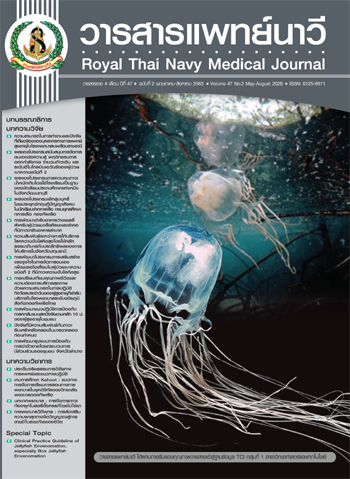Development of a Program to Enhance the Motivation for Self-management in Delaying the Diabetic Nephropathy Progression of Type 2 Diabetic Patients with Hypertension
Main Article Content
Abstract
This research and development aimed to develop a program to motivate type 2 diabetic patients with hypertension to self-manage in delaying the progression of diabetic nephropathy. The study was conducted in Nong Ruea Subdistrict, Na Chueak District, Maha Sarakham Province. Four steps of the program were: 1) situational analysis; 2) program development, validation, and pilot study; 3) implementation to determine the program’s effectiveness; and 4) program evaluation, improvement, and confirmation. Using 26 purposively sampled type 2 diabetic patients with hypertension and using one group pretest-posttest design, the program was carried out from October 2017 to March 2019. The data were analyzed using descriptive statistics, t-test, and content analysis. The results revealed as follows:
1. The program consisted of four parts conducted over 12 months: 1) participate to care by patients and families, 2) motivation for health behavior change, 3) enable patients to self-manage their diabetes and hypertension, 4) facilitate ongoing support for patients’ self-management. Group activities were carried out through community meeting, group discussion, and role modeling. Individual activities were performed by health education, motivational interviewing, self-management skill training, and promoting empowerment during home visits. Prior to program implementation, experts reviewed and validated the program’s content and found that the program was feasible for implementation.
2. The results for program implementation revealed that 1) The overall scores and each aspect of self-management after implementing the program were higher than at the baseline (p < .05), 2) The average HbA1C was lower than the baseline (p < .05), 3) After program implementation, all subjects were in the same stage of chronic kidney disease, when compared with baseline, and 4) A representative sample of the patients, caregivers, healthcare providers, village health volunteers, and community leaders expressed that the program was valuable and feasible. The results indicated that the program was efficient and effective in motivating patients with type 2 diabetes mellitus and hypertension to delay diabetic nephropathy.
Article Details

This work is licensed under a Creative Commons Attribution-NonCommercial-NoDerivatives 4.0 International License.
References
International Diabetes Federation. IDF Diabetes Atlas Ninth edition 2019. [Internet]. [cited 2017 September 1]. Available from: https: //www.diabetesatlas.org/.
International Diabetes Federation. IDF Diabetes Atlas Ninth edition 2019: factsheets. [Internet]. [cited 2017 September 1]. Available from: https://www.diabetesatlas.org/.
Ngarmukos C, Bunnag P, Kosachunhanun N, Krittiyawong S, Leelawatana R, Prathipanawatr T, et al. Thailand diabetes registry project: prevalence, characteristics and treatment ofpatients with diabetic nephropathy. J Med Assoc Thai 2006;89(Suppl 1):S37-42. (in Thai).
Satirapoj B. Diagnosis and management of diabetic nephropathy. Royal Thai Army Medical Journal 2011;64(1):53-63. (in Thai).
Thungtong S. Delayed progression diabetic nephropathy in patients with uncontrolled type 2 diabetes mellitus. Journal of The Royal Thai Army Nurses 2017;18(Suppl 2):S17-24. (in Thai).
Petrie JR, Guzik TJ, Touyz RM. Diabetes, hypertension, and cardiovascular disease: clinical insights and vascular mechanisms. Can J Cardiol 2018;34(5):575-84.
Thai National Health Examination Survey V Study Group. Thai National Health Examination Survey, NHES V. Nonthaburi, Thailand: National Health Examination Survey Office, Health System Research Institute; 2016. (in Thai).
Hau Kao Tak Health Promoting Hospital. The diabetic annual statistics report 2016-2018. Mahasarakham: Mahasarakham Hospital; 2018. (in Thai).
Diabetes Association of Thailand, The Endocirne Society of Thailand, Department of Medical Services, National Health Security Office. Clinical practice guideline for diabetes 2017. Pathum Thani: Romyen Media; 2017. (in Thai).
Hau Kao Tak Health Promoting Hospital. The focus-group for diabetic care development report. Mahasarakham: Mahasarakham Hospital; 2018. (in Thai).
Kruglanski A, Chernikova M, Kopetz, C. Motivation science. In: Scott R, Kosslyn S, editors. Emerging trends in the social and behavioral sciences. New York: Wiley; 2015.
Miller WR, Rollnick S. Applications of motivational interviewing. Motivational interviewing: helping people change. 3rd ed. New York: Guilford Press; 2013.
Lorig KR, Holman HR. Self-management education: history, definition, outcomes, and mechanisms. The Society of Behavioral Medicine 2003;26(1):1-7.
Bandura A. Self-efficacy: the exercise of control. New York: W. H. Freeman; 1997.
Schaffler J, Leung K, Tremblay S. Merdsoy L, Belzile E, Lambrou A, et al. The effectiveness of self-management interventions for individuals with low health literacy and/or low income: a descriptive systematic review. J Gen Intern Med 2018;33:510-23.
Lundahl B, Moleni T, Burke BL, Butters R, Tollefson D, Butler C, et al. Motivational interviewing inmedical care settings: a systematic review and meta-analysis of randomized controlled trials. Patient Educ Couns 2013;93(2):157-68.
Taba H. Curriculum development: theory and practice. New York: Harcourt, Braced World; 1962.
Nastasi BK, Schensul SL. Contributions of qualitative research to the validity of intervention research. Journal of School Psychology 2005;43(3):177-95.
Kemmis S, McTaggart R, editors. The action research planner. Victoria, Australia: Deakin University Press; 1988.
Powers MA, Bardsley J, Cypress M, Duker P, Funnell MM, Fischl AH, et al. Diabetes self-management education and support in type 2 diabetes: a joint position statement of the American Diabetes Association, the American Association of Diabetes Educators, and the Academy of Nutrition and Dietetics. Clin Diabetes 2016;34(2):70-80.
Salimi C, Momtazi S, Zenuzian S. A review on effectiveness of motivational interviewing in the management of diabetes mellitus. Journal of Psychology and Clinical Psychiatry 2016;5(4):00294. DOI: 10.15406/jpcpy.2016.05.00294.
Ren Y, Yang H, Browning C, Thomas S, Liu M. Therapeutic effects of motivational interviewing on blood pressure control: a meta-analysis of randomized controlled trials. Int J Cardiol 2014;172(2):509-11.


